|
|
Source
|
|
CWGC
|
SDGW
|
Uttoxeter Advertiser
|
Other
|
|
Parents
|
John Thomas and Annie Arnold
|
|
|
|
3
|
|
Where born
|
Birmingham
|
|
Yes
|
|
2 10a
|
|
When born
|
|
|
|
|
|
|
Address
|
8, Spring Cottage, Balance Hill, Uttoxeter
|
|
|
|
5
|
|
Balance Hill, Uttoxeter
|
|
|
6a 6c 6d
|
2 3 5
|
|
Spouse
|
|
|
|
|
|
|
Children
|
|
|
|
|
|
|
Employment Before Joining up
|
Messrs. Pakeman and Co. (Grocer’s shop)
|
|
|
6a
|
2
|
|
When Enlisted
|
|
|
|
|
|
|
Where Enlisted
|
Uttoxeter, Staffordshire
|
|
Yes
|
|
2
|
|
Regiment
|
North Staffordshire (Prince of Wales’s)
|
Yes
|
Yes
|
6a
|
4 7
|
|
Unit
|
1st Bn
|
Yes
|
Yes
|
|
7
|
|
Rank
|
Lance Corporal
|
Yes
|
Yes
|
6a 6b 6c 6d
|
3 5 6e
|
|
Service Number
|
9430
|
Yes
|
Yes
|
|
4 7
|
|
Date of Death
|
31st Aug 1916
|
Yes
|
Yes
|
6b 6c 6d
|
3 7
|
|
Age at time of death
|
26
|
|
|
6a
|
3
|
|
Where Killed or died
|
Somme - Delville Wood
|
|
|
6a
|
3
|
|
How he died
|
Killed in action
|
|
Yes
|
6b 6c 6d
|
2 7
|
|
Location of Grave or Memorial
|
Delville Wood Cemetery, Longueval Grave VII. E. 2
|
Yes
|
|
|
|
|
Awards
|
1914 Star: Roll F/2/3 Page 3
|
|
|
|
|
|
British War Medal: Roll F/104B3 Page 315
|
|
|
|
|
|
Victory Medal: Roll F/104B3 Page 315
|
|
|
|
|
|
Clasp 2/2951
|
|
|
|
|
Photograph with thanks to Pat Swinson, Edward’s niece
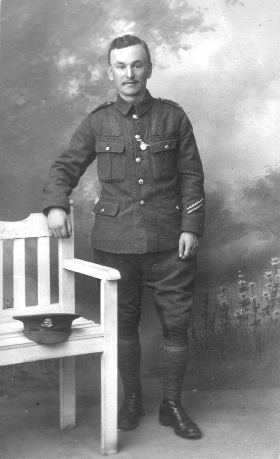
Edward’s parents were John and Annie Arnold. They both came from Oxfordshire and Edward was born in Birmingham.
He had three brothers and two sisters – John, Oliver, Ernest, Elsie and Hannah; they were all born in Birmingham.
The family moved to Uttoxeter between 1900 and 1901, where they lived at 8, Spring Cottage, Balance Hill, Uttoxeter
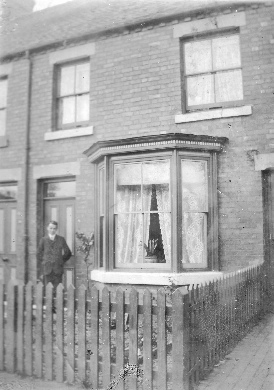
Unfortunately the house no longer exists and a road now runs through its site
Photograph with thanks to Pat Swinson, Edward’s niece
Before the war Edward worked for Messrs. Pakeman and Company, a Grocer’s Shop.
Edward joined the army in about 1910 and went into the 1st Battalion, North Staffordshire Regiment. His regimental number was 9430 and he achieved the rank of Lance Corporal.
He served at the front from the commencement of the war, having disembarked on 10th September 1914. He was therefore one of the original British Expeditionary Force (BEF) and an ‘Old Contemptible’.
In January 1916 the Uttoxeter Advertiser included Edward’s name in a list of servicemen who had written to thank the townspeople for the Christmas parcels that they had sent. He was serving with the BEF.
News of his death reached his parents via Mrs. Smith of Golden Ball Yard, Uttoxeter. Mrs. Smith’s son, Private Smith, had assisted in the recovering of his body.
His death was the third tragedy that had hit his parents. Two of his brothers had previously died in accidents during childhood. His brother Ernest died in a bathing accident and John fell down a well.
The third of his brothers, Oliver, served with the Montgomery Yeomanry and survived the war. At the time of Edward’s death, Oliver was ill in hospital in Egypt.
Edward’s obituary in the Uttoxeter Advertiser said that he met his death in Delville Wood (in the Somme area of France) through the ‘blowing-up of a trench’.
The regimental records make no mention of mining activity in Delville Wood, but they do speak of long periods of the Germans bombarding, sometimes intensely, the British trenches. We therefore believe that he died when his trench was hit by one or more shells during one of the bombardments.
The Regimental records for this period are very detailed and enable us to form a good picture of what happened during the last week of his life:
24th August Fine day. General Capper C.B. inspects all drafts since 1st Aug. Rather a poor lot, especially those from the SHROPSHIRES.
25th August Dull hot day. Some heavy showers. Move at 9 a.m. to bivouacs between DERNACOURT and MELLENCOURT. Bad march. Many checks from the front. Arrive about 3.45 p.m. almost [xxxxxxxxxxxxx] with an enemy shell which burst on AMIENS-ALBERT ROAD. Men very tired and not in good marching trim.
26th August Dull day. Some showers. Advanced party visit DELVILLE WOOD trenches with a view to taking them over shortly. Trenches in poor condition. Communications practically non-existent.
27th August Showery day. General Capper C.B. inspects and addresses the 72 Infantry Brigade at 9:30 a.m. [see below] Battalion moves into close Billets in RIBEMONT 2:15p.m. Accommodation very inadequate but affording some shelter from the rain. Company commanders visit DELVILLE WOOD sector, leaving at 5:30a.m.
28th August Showery day. Two officers C & D Co[mpan]ys out guides visit DELVILLE WOOD sector. Training carried out.
The address which the Divisional Commander gave to the men was as follows:
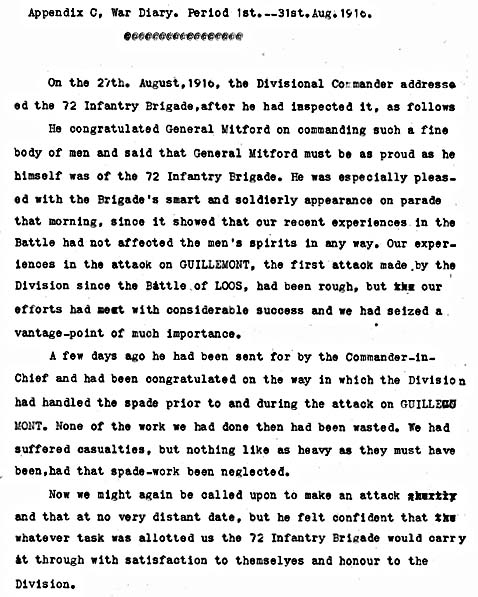
The war diary entries and the corresponding transcriptions that follow record their movement into the front-line trenches and the days on which Edward was killed.
29th August Dull day. Two officers out guides A & B Companies, Signals Sergeant and Major CONWAY, D.S.O., visit DELVILLE WOOD Sector. 24 DIVISION in Corps Reserve to attack of 4th Army. 72 Infantry Brigade relief to move at 4 hours’ notice. Subsequent orders received to the effect that these 6 positions are postponed 48 hours and that 24 Div. will relieve 14 Div and 33 Div on night 30/31 August
30th August Cold rainy day. Slimy cutting S.W. and frequent heavy showers. Leave RIBEMONT 6:10a.m. March to Camp in F.8.d. arriving about 9:15a.m. Men very wet and accommodation in Camp is limited. “B” [Company] move off to relieve 9th RIFLE BRIGADE in DELVILLE WOOD at 5:30 p.m. Arrive at BERNAFAY QUARRY 7:30p.m. WOOD shelled at intervals during relief.
Our relief dispositions as follows: C Company held from ALE ALLEY exclusive to about S.18.b.7.9 (See Map) with two advanced posts; D Company held from S.18.b.7.9 to JUNCTION of COCOA LANE – INNER TRENCH exclusive with the advanced posts near BEER TRENCH; B Company held DEVIL’s INNER TRENCH; A Company were in reserve in YORK AVENUE.
31st August Relief complete 4:45a.m. dull day. Enemy shell WOOD and vicinity fairly heavily from 9a.m-11a.m. Intense bombardment of all trenches in WOOD in front of it and behind it from 11a.m.-3p.m.
About 12 noon enemy made frontal attack on 1st SOUTH STAFFORD REGT. in the half on our RIGHT. This was repulsed by machine gun fire, as was a second front attack. A third bombing attack was made down HOP ALLEY which succeeded in driving the SOUTH STAFFORDS out of their trenches NORTH of HOP ALLEY, capturing the ALE ALLEY BARRIER and in the confusion seizing about 40 YARDS of the extreme
RIGHT of EDGE TRENCH. As one of our Lewis guns and a large number of bombs had been sent to the SOUTH STAFFORDS and many of the S. STAFFORDS retired down our trench this attack was more easily successful than it should otherwise have been.
Our RIGHT rear as completely in the air and the whole of the position in great danger of being buried. Happily 2/Lt. S.J. WORSLEY, M.C. managed to rally some of the SOUTH STAFFORDS in the WOOD and LIEUT. BOSTOCK threw out a Lewis Gun as a defensive flank to his right rear, while 2/Lt. I.A. WHILE very gallantly resisted the enemy’s advance in the Trench. When the enemy’s advance was stemmed finally sixty bombs only were left in our RIGHT Company and both Company Lewis Guns were out of action (that with the SOUTH STAFFORDS having been lost while the other had been put out of action by a bomb). It was therefore essential to bring up further guns S.A.A. and bombs before any counter-attack could be attempted.
Heavy shelling continued throughout the remainder of the day, the SOUTH and SOUTH-EAST edges of the WOOD being continuously barraged. Back on [the] LEFT no actual attack was made against our front but on the 8th ROYAL WEST KENTS abandoning their front line in BEER TRENCH and the STRONG POINT in COCOA LANE on account of the bombardment, the enemy advanced down COCOA LANE and seized the STRONG POINT. Our LEFT POST was then completely in the air on its left and the N.C.O in charge, seeing the SOUTH STAFFORDS retiring on his right rear, decided to withdraw to the WOOD. This he did, establishing himself in EDGE TRENCH about 50 yards EAST of its junction with COCOA LANE, so making a defensive flank for the remaining posts.
The officer in]charge [of] No2 POST, seeing what had happened, sent two men over to NO3 post to discover if the enemy had occupied it and on finding that they had not done so these men remained there and held the POST on their own.
None of this information had been received a Battalion HDQTRS and the first intimation of any attack was brought by CAPT. PRESTON (later on hearing of the arrival of the 2nd QUEENS [Regiment] only ½ A Company was sent forward). This information was received at 8:30 p.m., but unfortunately CAPT. PRESTON lost his way and eventually the Half-Company was sent to reinforce B Company in DEVILS Trench, the remaining two platoons joining it there later.
No further attacks were made during the remainder of the day or night, but a heavy barrage was kept up all night on DELVILLE WOOD. The 2nd QUEENS relieved the 8th ROYAL WEST KENTS on our LEFT.
It is possible that it was the intense shelling during the morning which killed Edward Arnold and Charles Wood (also from Uttoxeter). A message sent from the front line at this time to Brigade Headquarters reported the fact that they had received heavy casualties:
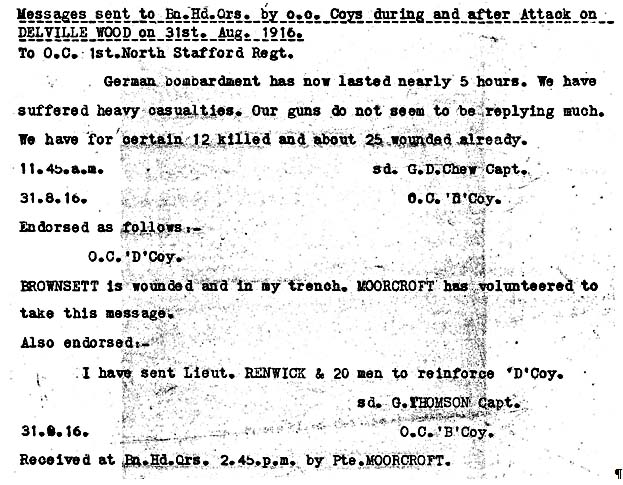
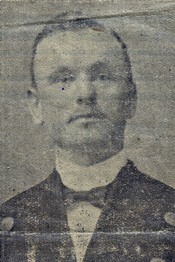
This photograph of Edward was published with his obituary6a by the Uttoxeter Advertiser
Photograph with kind permission from the Uttoxeter Advertiser
Some time after receiving news of Edward’s death, his mother received his personal effects, which comprised nothing more than his dog tag. This has been kept in the family, wrapped in the note that she wrote:
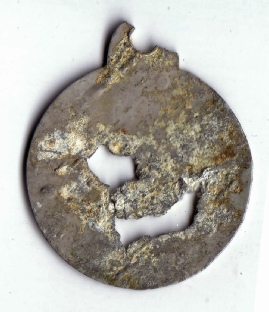
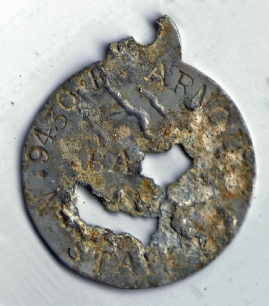
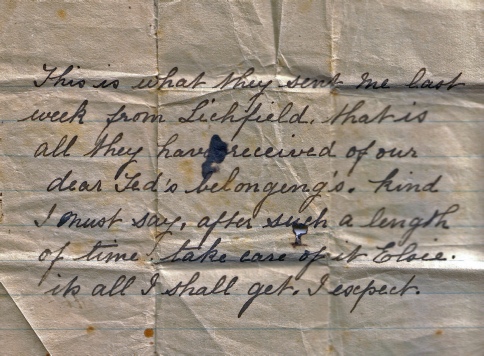
“This is what they sent me last week from Lichfield. That is all they have received of our dear Ted’s belongings. Kind I must say, after such a length of time. Take care of it Elsie. It’s all I shall get, I expect.”
Edward had a sweetheart, who lived to an old age. She did marry, and she had a family, but she never stopped wearing the gold bracelet that he had given her just before he went to war.
Edward’s parents produced this card in his memory
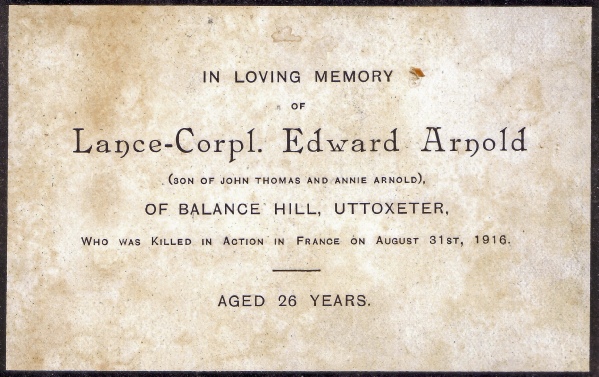
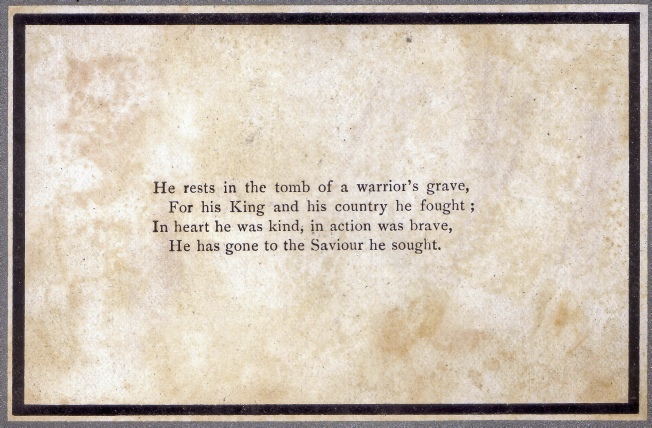
Edward is buried in the cemetery which lies opposite the entrance to Delville Wood.
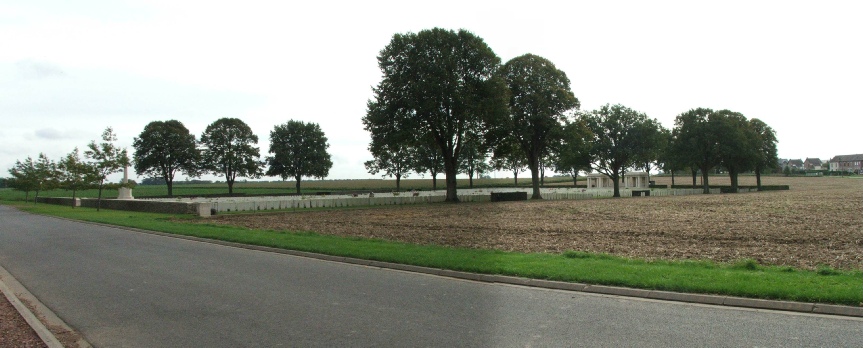

This photograph shows Delville Wood Cemetery in the foreground and Delville Wood itself in the background.
This was not the original position of his grave. The cemetery was formed after the war, when the authorities concentrated the graves from all over the battlefield. Edward’s remains were moved there in February or March 1920 and his family were informed of the fact by means of the letter below:
I am directed to inform you that in accordance with the agreement with the French and Belgian Governments to remove all scattered graves, and small cemeteries containing less than 40 graves, and certain other cemeteries which are situated in places insuitable for permanent retention, it has been found necessary to exhume the bodies buried in this area and to re-inter them in Cemeteries. The body of the abovce mentioned has accordingly been removed and buried in Delville Wood Cemetery, East North East of Albert.Plot 7, Row H. Grave 2.
The new grave has been duly marked, and registered in this office.
The re-burial has been carefully and reverently carried out, special arrangements having been made for appropriate religious services to be held. Your request for a photograph has been noted.
This letter gives his grave row number as H, which is not true now. He is actually in grave VII.E.2.
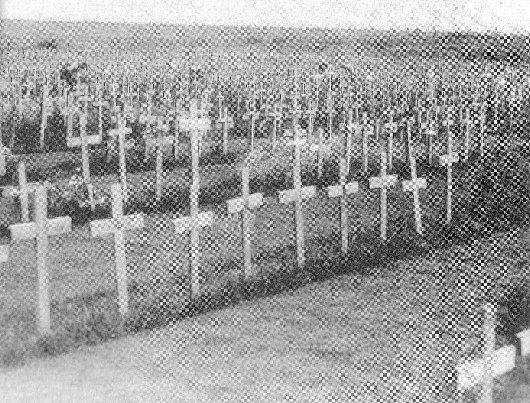
This photograph shows the cemetery as it was in the early 1920s
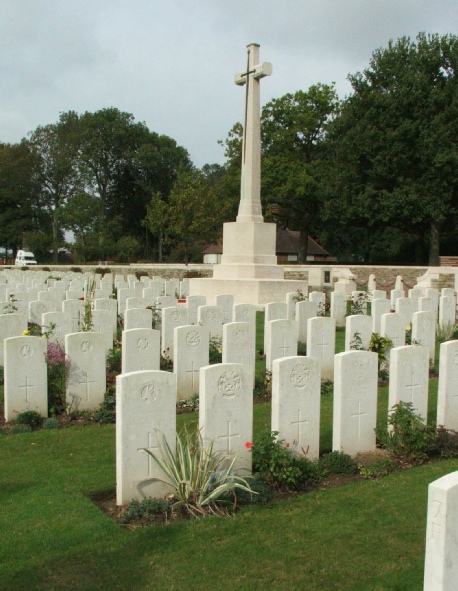
Edward’s grave is the second from the left in the front row of this photograph
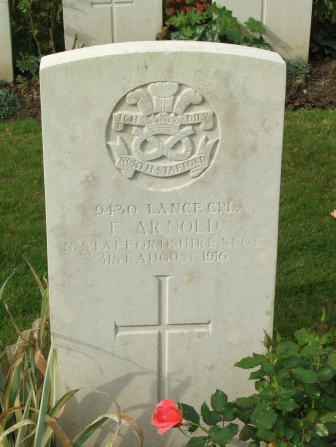
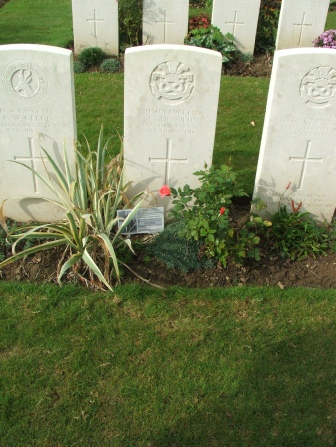
This notice was posted in the Uttoxeter Advertiser in August 1917 to mark the first anniversary of his death
This notice was posted in the Uttoxeter Advertiser in September 1918 and 1919 to mark the second and third anniversaries of his death
In Loving Memory of Lance-Corpl. Edward Arnold, who was killed in action in France on August 31, 1916.
- Fondly remembered by his loving Mother, Father, Brother and Sisters.
In Loving Memory of Lance-Corpl. Edward Arnold, killed in action, August 31, 1916.
His warfare o’er, his battle fought,
His victory won, though dearly bought;
His fresh young life could not be saved.
He slumbers now in a hero’s grave.
-Sadly missed but always remembered by his Loving Father and Mother and Brother and Sisters, Balance-hill, Uttoxeter
Edward was awarded the 1914 Star, the British War Medal and the Victory Medal. He was also given a Clasp.
















